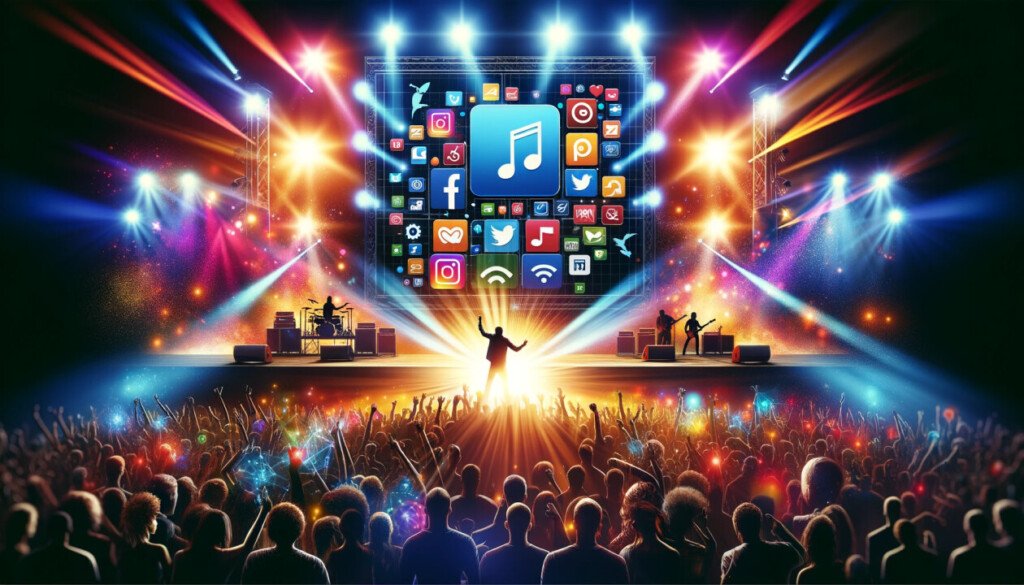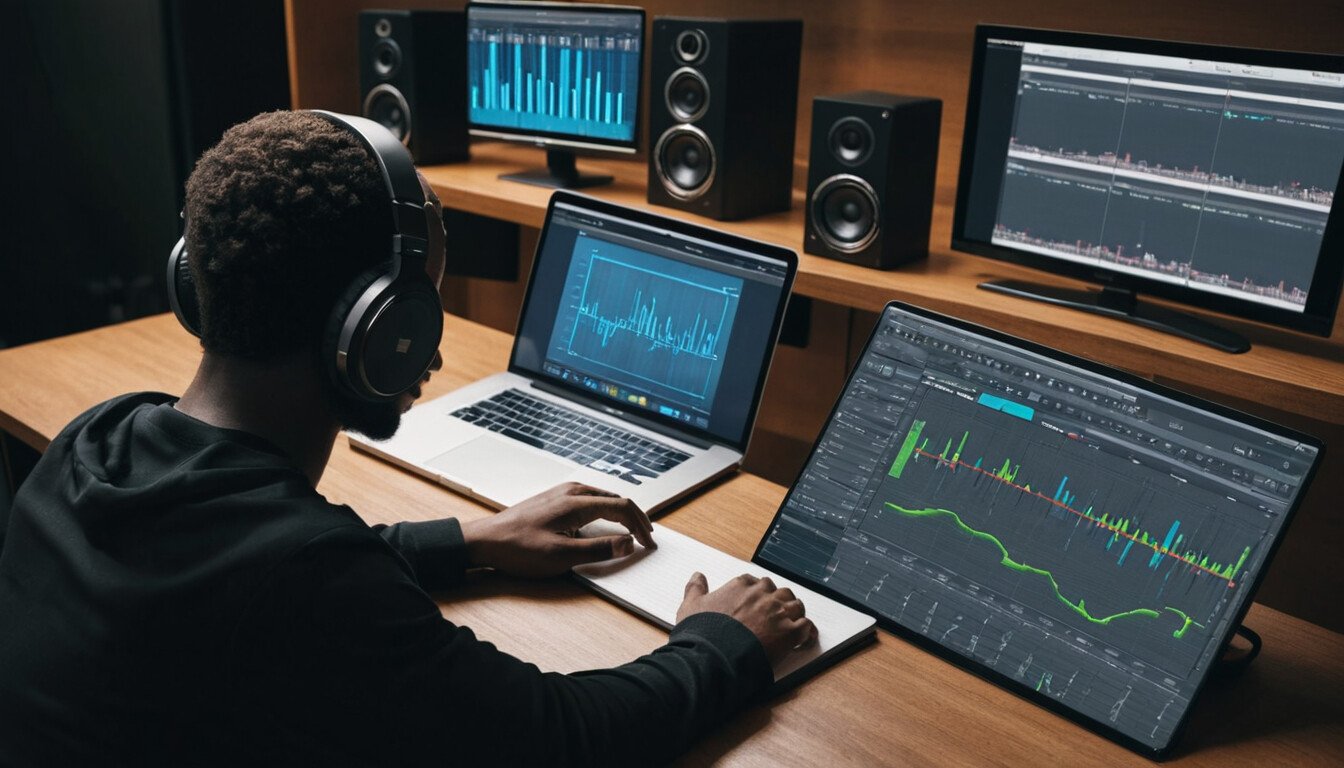
As the music industry continues to evolve in 2025, marketing your music requires a nuanced understanding of new trends, tools, and platforms. Whether you’re an independent artist trying to break into the scene or an established act looking to grow your audience, mastering these strategies is essential for reaching new fans, engaging with your current ones, and thriving in an increasingly digital landscape.
In this comprehensive guide, we’ll explore practical tips, real-life examples, and the latest marketing techniques that will help you navigate the music industry in 2025.
1. Harnessing the Power of AI in Music Marketing
Artificial Intelligence (AI) has become an indispensable tool for musicians and marketers alike. From analyzing fan data to predicting audience preferences, AI offers insights that can transform the way you market your music.
How to Use AI for Marketing Your Music:
- Audience Analytics: Platforms like Spotify and YouTube offer detailed analytics, but AI tools such as Chartmetric can dive deeper, providing insights into listener habits, song performance, and regional trends. Using this data, you can fine-tune your marketing strategy, targeting specific demographics or regions that are more likely to engage with your music.
- Chatbots and Voice-Activated Assistants: Chatbots can simulate interactions with fans, offering personalized recommendations or guiding them to merchandise. Similarly, integrating your music into voice-activated assistants like Alexa or Google Assistant can increase your reach, allowing fans to discover your work through voice search.
2. Building a Strong Social Media Presence
Social media continues to be the most direct way to connect with fans. However, in 2025, it’s not enough to simply post content—musicians must embrace a strategic, interactive approach.
Best Social Media Practices for Musicians:
- Short-Form Video: Platforms like TikTok and Instagram Reels remain essential for promoting music through viral trends and challenges. Musicians should collaborate with influencers to create catchy, shareable content that integrates their music.
- Fan Engagement through Polls and Live Streams: Regular engagement with fans through live streams, polls, and interactive Q&A sessions can deepen the fan-artist relationship. Hosting live “listening parties” on platforms like Twitch or YouTube can create a sense of community.
- Paid Social Ads: Use Instagram and Facebook ads to target specific demographics, such as fans of similar artists. Tailor your ads to reflect the tone and style of your music, using video snippets or concert footage to capture attention.
3. Embracing New Platforms for Music Distribution
While traditional platforms like Spotify and Apple Music remain important, new distribution avenues are emerging that allow musicians to take greater control over their music and how it’s shared.
Key Platforms for 2025:
- Bandcamp and Patreon: For musicians looking to establish a direct line with fans, platforms like Bandcamp and Patreon provide unique opportunities to offer exclusive content, merchandise, and live performances in exchange for financial support. This model allows artists to create a more sustainable income stream while building a loyal fanbase.
- NFTs and Web3: The rise of NFTs (non-fungible tokens) and blockchain technology provides musicians with a way to monetize their art in new ways. By selling unique digital assets—such as unreleased songs, digital album art, or concert tickets—artists can generate additional revenue while offering fans something truly exclusive.
4. Optimizing Your Website for Fan Engagement
In 2025, your website remains the core of your digital presence, and it’s crucial that it provides fans with seamless experiences while allowing you to capture valuable data for marketing purposes.
Interactive Content to Boost Engagement:
- Fan Polls and Quizzes: Polls can be embedded into your website, allowing fans to vote on topics like which songs to include in setlists, or even to provide feedback on upcoming projects. This creates a deeper connection and makes fans feel involved in the creative process.
- Exclusive Content Hubs: Set up members-only areas of your site where superfans can access exclusive tracks, videos, or behind-the-scenes content. You can also gamify the experience by rewarding loyal fans with badges, early access, or limited-edition merchandise.
These features foster community-building and provide a more immersive fan experience while encouraging repeat visits to your website.
5. Leveraging Streaming Platforms and Playlists
Streaming platforms like Spotify and Apple Music continue to be pivotal for music discovery, and the importance of playlist placement cannot be overstated. In 2025, musicians must develop targeted strategies to maximize the benefits of streaming.
Strategies for Playlist Success:
- Submit to Curators and Editorial Playlists: Platforms like Spotify offer submission tools for editorial playlists, but independent curators, such as those on YouTube and personal blogs, are also key to breaking into niche markets. Use platforms like SubmitHub, Musosoup or Groover to pitch your music directly to playlist curators.
- Create Your Own Playlists: By curating your own themed playlists, you can integrate your songs alongside similar artists, which helps to build your reputation and provides listeners with a cohesive musical experience. Share these playlists across social media and encourage fans to follow them.
- Collaborate with Other Artists: Collaborative playlists with other musicians or even influencers can expose your music to new fanbases, cross-pollinating audiences and fostering a sense of community.
6. Video Content: The Visual Revolution in Music
As the consumption of video content continues to grow, platforms like YouTube, TikTok, and Instagram Reels will remain indispensable for music marketing in 2025. Visual content not only complements your audio but also tells the story of your brand.
How to Utilize Video Content:
- Music Videos with a Twist: Produce videos that tell a compelling story or showcase unique visual elements tied to your music. Engage your audience by creating behind-the-scenes content, lyric videos, or alternative versions of popular tracks.
- Leveraging Short-Form Content: Platforms like TikTok are perfect for quick, engaging snippets of your music. Create challenges, trends, or viral content that encourages fans to interact with your music, increasing organic reach.
- Collaborating with Visual Artists: Work with graphic designers, animators, or directors to create visually stunning music videos or animated content that stands out and captivates your audience.
7. Email Marketing: A Timeless but Evolving Strategy
Even with the rise of social media, email marketing remains one of the most effective ways to promote your music in 2025. Building an email list gives you direct access to your fans, helping you control communication without the volatility of algorithm-driven platforms.
Effective Email Marketing Tips:
- Segment Your Audience: Tailor your emails to different segments of your fanbase—offer exclusive content or discounts to superfans, while sending general updates to casual listeners.
- Automated Campaigns for New Releases: Set up automated email sequences that notify fans of upcoming releases, new merchandise, or tour dates. Personalize the content by including first names and referencing previous fan interactions.
- Exclusive Offers and Pre-Sales: Reward your most loyal fans with early access to concert tickets, exclusive tracks, or limited-edition merchandise, incentivizing them to stay subscribed and engaged.
8. Collaborations and Partnerships: Expanding Your Reach
Collaborating with other artists, influencers, or even brands can significantly expand your reach. Partnerships in 2025 go beyond simply recording duets; they involve cross-promotion and shared marketing efforts.
Ways to Collaborate in 2025:
- Cross-Promotion with Other Musicians: Partnering with artists from different genres or regions can introduce your music to entirely new audiences. Joint releases, tours, or playlist features can amplify both parties’ visibility.
- Influencer Marketing: Work with influencers across platforms like Instagram and TikTok who resonate with your target audience. Have them feature your music in their content, creating a natural integration that feels authentic to their followers.
- Brand Partnerships: Aligning with a brand that matches your aesthetic or values can open doors to larger, non-music-specific audiences. Whether it’s a fashion brand or a tech product, these partnerships can create mutually beneficial promotions.
9. Innovative Monetization Techniques: NFTs and Crowdfunding
Beyond streaming and sales, musicians in 2025 are turning to creative monetization methods such as NFTs (Non-Fungible Tokens) and crowdfunding platforms to generate income and engage with their fanbase.
NFTs in Music Marketing:
- Selling Unique Digital Assets: Musicians can sell one-of-a-kind digital assets—like unreleased songs, digital artwork, or exclusive videos—as NFTs. These assets can provide fans with a sense of ownership and deeper connection to your music.
- Exclusive Access and Experiences: NFTs can also unlock exclusive experiences, such as virtual meet-and-greets, special concert tickets, or behind-the-scenes access to your creative process.
Crowdfunding as a Marketing Tool:
- Platforms like Kickstarter or Patreon: These platforms allow fans to directly support your music by offering financial backing in exchange for rewards like early releases, private concerts, or custom merchandise.
- Building Community through Crowdfunding: Crowdfunding campaigns can serve as more than just a financial tool—they can be used to create a tight-knit fan community. Offering fans the ability to contribute to your next album or tour fosters a sense of shared success.
Conclusion: Mastering Music Marketing in 2025
Music marketing in 2025 is a dynamic, multifaceted discipline that requires a blend of creativity, data-driven strategy, and a deep connection with your audience. By leveraging tools like AI, social media platforms, video content, and NFTs, musicians can build thriving careers that transcend traditional boundaries. Whether you’re just starting out or are an established act, adopting these strategies will allow you to navigate the complexities of the industry and ensure that your music resonates with the right audience.
This article has covered key music marketing strategies for 2025, but marketing is an ever-evolving field. What strategies have you found most effective for promoting your music? Share your experiences and insights in the comments below!

1 comment
Hey Great People
I’m Boi Tino
I Uprising Artist From Liberia
I’m Begging Every Member Of This Site To Please Shine A Brighter Light On My Game By Pitching It To The Globe 👏🏿✍🏾🎶